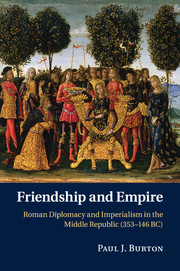Book contents
- Frontmatter
- Contents
- Preface
- Abbreviations
- Chapter 1 Discourse, International Relations, and International Relations theory
- Chapter 2 Friendship practices and processes
- Chapter 3 Amicitia incipit: beginning international friendship
- Chapter 4 The duties of international friendship
- Chapter 5 The breakdown and dissolution of international friendship
- Conclusion
- Bibliography
- Index
Chapter 4 - The duties of international friendship
Published online by Cambridge University Press: 05 December 2011
- Frontmatter
- Contents
- Preface
- Abbreviations
- Chapter 1 Discourse, International Relations, and International Relations theory
- Chapter 2 Friendship practices and processes
- Chapter 3 Amicitia incipit: beginning international friendship
- Chapter 4 The duties of international friendship
- Chapter 5 The breakdown and dissolution of international friendship
- Conclusion
- Bibliography
- Index
Summary
Introduction
The present chapter shifts our primary focus temporarily from IR Constructivism to Maussian gift exchange in the international sphere, and attempts to provide a complete account of the wide range of duties – the gifts, favors, and services, both material and symbolic – that Rome and her international amici performed for each other. Such exchanges, as was seen in Chapter 2, serve several purposes: to fulfill specific needs and desires (the “objective purpose” of exchanges), to advertise the existence of the relationship to the wider world, to acquire and assert power and status within the relationship, and to perpetuate the relationship through time by playing with the timing and tempo of reciprocity (the “subjective purpose” of exchanges). The strategies of misrecognition (méconnaissance) that friends employ in order to achieve situational advantage, which simultaneously preserve the illusion of symmetry and the pious wish of voluntary, disinterested, and spontaneous reciprocity, apply in the international sphere just as they do between individuals.
This matrix of meanings and rituals involved in exchanges between states has already been demonstrated in the earlier discussion of Scipio Africanus’ negotiations with the Spanish tribes following the Roman sack of New Carthage in 209 bc; on that occasion, the new friends/combatants exchanged competitively, continually raising the stakes of the exchange and redefining its nature as they jockeyed for status and power (above, pp. 73--75). Consider the following as well:
καὶ τὰ ἐς ἀρετὴν ἐνηντιώμεθα τοῖς πολλοῖς· οὐ γὰρ πάσχοντες εὖ, ἀλλὰ δρῶντες κτώμεθα τοὺς φίλους. βεβαιότερος δὲ ὁ δράσας τὴν χάριν ὥστε ὀφειλομένην δἰ εὐνοίας ᾧ δέδωκε σῴζειν.
[Pericles addressing the Athenian ekklesia] In matters concerning virtue, we are opposed to the many: it is not by receiving benefits but by conferring them that we acquire friends. The one doing the favor is the firmer friend, aiming, through continued goodwill towards the recipient, to preserve a sense of obligation in him.
(Thuc. 2.40.4)Beneficia gratuita esse populi Romani; pretium eorum malle relinquere in accipientium animis quam praesens exigere.
[The Roman senate to Cotys of Thrace] The kindnesses of the Roman people are free; the Romans prefer to leave the price of them on deposit in the hearts of the recipients rather than to collect it right away.
(Livy 45.42.11)Beneficia eo usque laeta sunt dum uidentur exolui posse: ubi multum anteuenere pro gratia odium redditur.
Kindnesses are welcome so long as it seems possible to repay them: they greatly exceed that point when hatred is repaid rather than gratitude.
(Tac. Ann. 4.18)The message resonates across several ancient Mediterranean cultures, from Thrace through Greece and Rome to Spain: bestowing gifts in the international context is in part a situational strategy used to perpetuate asymmetry and create obligation in the beneficiary. As the first two passages show, there was considerably less hesitation to articulate this strategy amongst state-friends than between individuals. Equally significantly, however, are the notional constraints on such gifting: an interval must occur before reciprocation, as the senate tells Cotys, and, as Tacitus indicates, there exists somewhere along the friendship continuum a tipping point that cannot be precisely identified in advance, but that must be intuited from within that continuum, when overbenefiting leads to hatred and resentment. One is reminded of Cicero's rich, honored, and happy men who wish to avoid receiving great favors lest their status slip from amicus to cliens (Off. 2.69, discussed above, p. 14).
- Type
- Chapter
- Information
- Friendship and EmpireRoman Diplomacy and Imperialism in the Middle Republic (353–146 BC), pp. 161 - 245Publisher: Cambridge University PressPrint publication year: 2011

